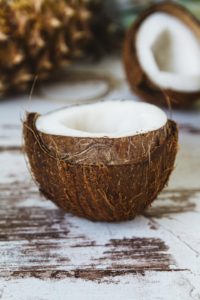Unless you’re cooling down under a palm tree on a scorching day in Fiji, the average person doesn’t need coconut water in their smoothies. Good old plain water isn’t fancy but it does the job.
Coconut water is nature’s Powerade. It is a natural electrolyte.
Would you drink Powerade in preparation for a long day of sitting on the couch? If you wouldn’t normally drink Powerade or Gatorade, there is no need to start drinking coconut water.
Each coconut yields ½ to 1 cup of coconut water. However, most of us buy it in bottles/cartons/cans nowadays. The problem is these are pasteurised to extend shelf-life and prevent microbes from growing. This does not destroy the electrolytes, as minerals are not destructed by heat. However, it is not as fresh as drinking fresh coconut water under a palm tree in Fiji (nothing compares!).
Show Me the Numbers
One 250ml cup of coconut water contains around 40 calories, 16.5g sugar/carbs, trace amounts of protein, no fat, and 600mg of potassium.
This is about the same potassium as a banana (depending on the coconut water and size of the banana).
It has less calories and sugar, while more potassium than sports drinks.
We shouldn’t really even compare nature with man-made food/drinks, but for the purpose of comparing electrolytes.
Nature’s Powerade
Per cup coconut water contains 5 key electrolytes:
- Potassium – 600mg (16% of the RDI for men and 21% of the RDI for women)
- Sodium – 252mg (11% of the RDI)
- Magnesium – 60mg (14% of the RDI for men and 19% of the RDI for women)
- Calcium – 58mg (6% of the RDI)
- Phosphorus – 48mg (5% of the RDI)
Electrolytes are the minerals that are lost through sweat during exercise or hot climates. Electrolytes are taken during or after intense physical activity.
They may also be low in people who drink too much plain water because the minerals in the blood become diluted.
Coconut water is classed as an ‘isotonic’ electrolyte. This means it has a similar concentration of sugar and salt, as our body. Isotonic drinks are absorbed more rapidly due to their similarity of concentration to our blood. They hydrate you more quickly than water. If someone is dehydrated, coconut water is more hydrating than water. Powerade and Gatorade are also marketed as isotonic.
In contrast to hypertonic (more sugar and salt than our body) and hypotonic (less sugar and salt than our body). Fruit juice and fizzy drinks are considered hypertonic because they contain more than 20g of sugar/carbs per 250mls. Water is hypotonic of course.
If you do call yourself an athlete, coconut water (with a pinch of salt) is far superior option than synthetic alternatives. The rule of thumb is if you’re working out intensely for more than an hour, coconut water has its place.
Trust Mother Nature
Other than exercise, coconut water is a helpful way to replace to electrolytes lost during sweating in a hot climate e.g. Fiji. Hence why coconuts grow in Fiji (and tropical locations).
Nature got it right, as always.
Coconut water plus a pinch of salt is the closest thing to our blood plasma. It is reported that coconut water with a pinch of salt was administered intravenously (IV) to soldiers during world war 2 and the Vietnam War when regular IV saline solution was in short supply. On its own, coconut water lacks sodium to replicate blood plasma. Hence why the pinch of salt was added. This is not recommended unless a life-threatening situation arises!
Water vs. Milk
Don’t confuse coconut water and coconut milk.
Coconut water is the sugar of the coconut. Coconut milk (and cream) is mostly the fat (and MCTs) of the coconut.
Coconut water comes from young, green coconuts. Coconut milk/cream comes from mature, brown coconuts.





